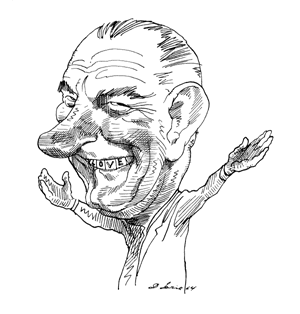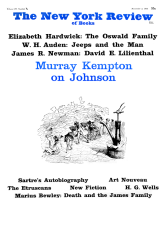This is the month when Mr. Johnson seems to swell and fill all our politics and, to find his like, we despair in our own history and come to settle on the reign of George II. Mr. Johnson is at once the Hanoverian King and Robert Walpole, his own great minister, and there is no alternative to him but the Old Pretender, cursing and praying in his imaginary court.
Random House here has given us the monarchical Mr. Johnson as Horace Walpole remembered him, “uniformly meritorious [and] absurd.” As a document it is all House of Hanover; the mixture with Walpole intrudes only in the cover portrait, where Mr. Johnson seems to have attempted with heroic concentration to look toward the stars. The total effect is of John Wayne listening while Jonas Mekas’s Village Voice review of “The Alamo” is read aloud to him. The monarch looks with love; his great minister knows too much to look with anything but mistrust. There is on this face both the effort to believe everything and the experience to believe nothing. It is a low face of high aspirations.
Being the king’s face, it is innocent in a way in which General Eisenhower could not imagine being innocent; being also the minister’s face, it is devious to a degree that Everett Dirksen would find serpentine. Of course, it lies to itself, and that is proper. Hervey said to Walpole: “All princes must now and then be deceived by their ministers.”
Mr. Johnson distributes his vanity undiminished between the king in him and the minister. He is proud of the coarse in himself. “I do not,” he has said, “trust a man unless I have his p-ck-r in my pocket,” and all of Robert Walpole’s conversation seems to have been just such a struggle towards so perfect a distillation of his experience with the management of public affairs. Mr. Johnson is also proud of the ceremonial in his person. Ceremony is the art of lying to oneself and one’s subjects; the true king lies better to himself than any minister could. Hervey and Walpole, “though neither of them were very partial to his majesty,” had to confess that, “with a woman who could be gained by writing, they would rather have any man in the world for a rival than the King. Nor, indeed, in the gift of writing love letters, do I believe any man ever surpassed him.” The love letter is a royal art, since it begins with the lie to self. This is Mr. Johnson’s letter to his current mistress, all America.
My Hope for America is, we are told, the first book written by a President of the United States while he was in office. The claim does not seem remotely reasonable; there is a two-page Preface evidently composed by the President in a style clearly his own and depressingly like Conrad Hilton’s. The rest is a collage of fragments of the President’s various speeches and state papers. Mr. Johnson sternly guards his hope of appearing great to generations to come. The words of great men do have a way of surviving in fragments fallen off the ruined structures of what were once whole speeches; and the book is thus a sort of instant artifact.
It is, then, a royal monument; we could only speak of Mr. Johnson as having written it to the extent that we could speak of George VI’s speech from the Throne in 1945 as an announcement of his majesty’s conversion to Socialist principles. The selection has been limited, of course, to formal papers; we miss Mr. Johnson ex tempore, a wild and occasionally extraordinarily moving regurgitator of whatever is in his belly, be it fire or food. Mr. Johnson dressed for history has no tolerance for Mr. Johnson unbuttoned.
The selection has been careful, as it should be when the job is to pick the dross upon which flakes of gilt remain from the dross unadorned. The source is stuff which could hardly have been printed before except in The New York Times, for no reason beyond its compulsion about official texts, and which I should doubt was read then or since by anyone except a proof reader, its editor, and myself. Going through, in fact, I found two typographical errors; I may then have been traversing virgin country.
What is rather odd is that there is so little in the style and the thought that differs in substance from those qualities in Warren G. Harding which led Mencken to remark that a Harding sentence was a string of wet sponges. There is the same vagueness of relation between the verb and its object: “Poverty,” Mr. Johnson tells us, “not only strikes at the needs of the body; it attacks the spirit and undermines human dignity.”
Advertisement
There is the same comfortably commercial Protestant moral creed. Mr. Johnson avoids reprinting any of those hoarse improvisations about the Negro’s right not to be humiliated by strangers in public, which are the most effective things he has ever said on the subject, and finds it more important to give us this argument:
Wherever we live we must ask ourselves: are we prepared? Are we prepared to give up our prosperity and our peace and let our prejudices make paupers of us all? Are we of this generation to be remembered for allowing America’s progress to run aground on the shoals of race prejudice?
The rock of the covenant is still the faith that to do good is to make money. The line runs straight from Dr. Frank Crane to Norman Vincent Peale.
There is, it must be conceded, a certain widening of the frame of literary reference since Harding’s America:
A few years ago we were greatly concerned about the Ugly American. Today we must act to prevent an Ugly America…We hear that the individual is being smothered by giant concentrations of power. We are told that the individual can count for little in The Era of the Organization Man.
The difference is clear. Harding lived before the cultural explosion instructed the official style in the elegance lent any discourse by the invocation of the names of works which neither the speaker nor his auditors have read. In thirty-four years we have advanced from a President who quoted nothing that he had not read on a fifty-cent piece to a President who quotes what he reads on the backs of the books in somebody else’s library.
Mr. Harding was all monarch; Mr. Johnson is many other people. But their speeches from the throne reflect that assurance which we can think of as quintessentially royal; the national soul, from past to present, is uniformly noble, being the royal soul:
“Those who founded our country,” Mr. Johnson says, “knew that freedom would be secure only if each generation fought to renew and enlarge its meaning. From the Minutemen in Concord to the soldiers in Vietnam, each generation has been equal to that trust.” Only a mind truly royal could look back upon the years from 1870 to 1900 and arise with comforts so intact.
There are differences, of course, and it would be foolish not to be grateful for them. Harding was incessant in reminding all Americans that they were acting with special magnanimity when they were being particularly selfish. There is only one page on which the national voice of Mr. Johnson is arguably Pecksniffian:
The Gulf of Tonkin may be distant Asian waters, but none can be detached about what happened there. Aggression—deliberate, willful, and systematic aggression—unmasked its face to the entire world. The world remembers—the world must never forget—that aggression unchallenged is aggression unleashed.
Mr. Johnson is talking about an aggression launched from the coast of the aggressor against an American vessel as far away from our shores as it could get without being on its way back. It is an incident of great complexity; but there is a kind of assumption of divine right in choosing language to describe it which might, with greater geographical precision, have been used by Ho Chi Minh. Here and only here, we hear the voice with which kings talked in the last intact age of kings; the voice Frederick of Prussia heard in Maria Theresa: “She weeps, but she always takes.”
This Mr. Johnson then is this generation’s Harding, comforting where his opponents disturb, preeminently a safe and normal man, the more comfortable because no one has to read him any more than anyone had to listen to Harding.
Of course, he presents to us normalcy. But we should be grateful for what Americans, by hard struggle and adventure, have come to think of as normal. We are winding up a campaign which seems more and more a ratification of the 1948 election. Mr. Johnson reminds us twice how Franklin D. Roosevelt brought him to the White House when he was just twenty-seven years old; the name which for so long was the signal of disturbance becomes in this memory a soft and soothing sound from a lullaby.
“We must help the developing countries because our own welfare demands it.” Mr. Johnson says. “It takes no great gift of foresight to realize that unless there is progress, there will be discontent.”
From anyone except Mr. Johnson, “discontent” would seem a rather feeble summary of the horrors to be predicted if we do not do something about social stagnation. And yet, one supposes, here Mr. Johnson speaks more than anywhere else as the watchman giving the alarm in the night; plainly the worst thing to be imagined is the growth of discontent.
Advertisement
There is every indication that he will be elected so commandingly just because he so contents. But it is rather remarkable to read him and remember what it is with which we are by now content and what it is we have come to take for granted. Mr. Johnson tells us, in the common voice of normalcy, that we take for granted the civil rights law, our trust in the Russians to join us in ending nuclear tests, the duty to raise the lives of the poor and the sick. He calls us back to Roosevelt and comfort as Harding called us back to McKinley and comfort. He may then not have given us much of a book, but he does present us with a precious object of history.
There is hardly a sentence Mr. Johnson prints which is not routine, lusterless, and worn thin from usage by other men. To read him then is to pick through the racks of a dealer in second-hand national pieties. And yet how many conceptions of national purpose that were disputed as visionary come now to rest comfortably in the wardrobes of Mr. Johnson’s stall? The national pieties of Lyndon Johnson would in the main have seemed impious to Warren Harding.
Thinking of that, we begin to be grateful to Mr. Johnson just for the tone and the style which impels the recognition of their kinship. We end proud, with all our sins, of how far we have come; every generation gets, after all, the clichés it deserves.
This Issue
November 5, 1964




